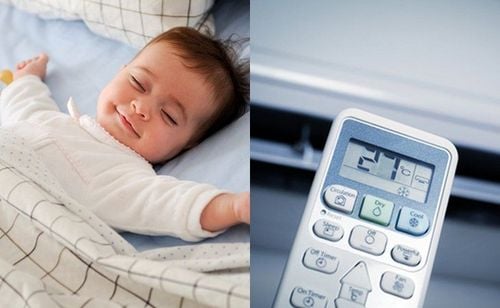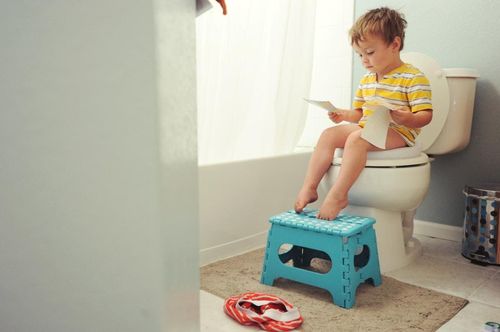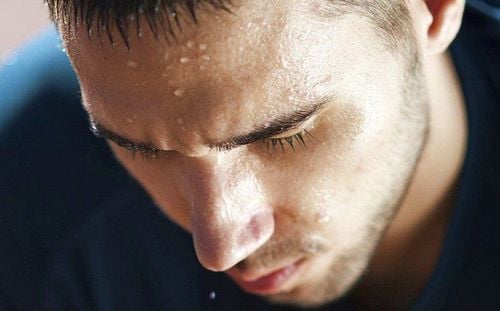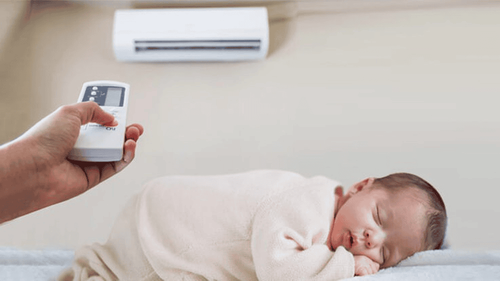Children are very prone to coughing with phlegm during weather changes or when the temperature drops. Parents often struggle to know what to do to minimize the risk factors that can worsen the condition. One common question is whether children with a cough should sleep with a fan or an air conditioner.
1. Causes of Cough and Excessive Sweating in Children
Coughing is a reflex of the body to clear the airways. When the respiratory tract is compromised by viruses, bacteria, smoke, vehicle exhaust, dust, etc., the body will cough to expel these irritants.
Children cough and sweat excessively due to various reasons, from mild to severe, such as colds, bronchitis, pneumonia, respiratory infections, allergies, asthma, air pollution, etc.
Improper use of air conditioners can also cause children to cough and sweat excessively. If the air conditioner is not cleaned regularly, the dust filter becomes a breeding ground for many types of bacteria, viruses, and mold. When the air conditioner operates, children inhale these contaminants, leading to allergic rhinitis. Parents, fearing their children will get cold, often set the air conditioner temperature too high, causing children to feel stuffy and sweat on their backs and necks.
In fact, many studies show that family habits also affect the severity of a child's cough. Habits such as eating cold food, bathing in cold water, playing in the rain, and splashing water can trigger and exacerbate viral infections. However, most coughs caused by viruses in children are benign and can be managed at home. Additionally, dressing children in too many layers can cause them to sweat excessively, leading to colds and coughs, and even pneumonia.
Studies have shown that when children are exposed to cold temperatures, the small blood vessels in the nasal mucosa, throat, and upper respiratory tract constrict, reducing blood flow to these areas. Reduced blood supply means fewer nutrients and immune cells to fight off pathogens. Moreover, cold weather creates a favorable environment for certain viruses to thrive. Weather changes also allow some viruses to survive longer, making the throat and nose more susceptible to infections.
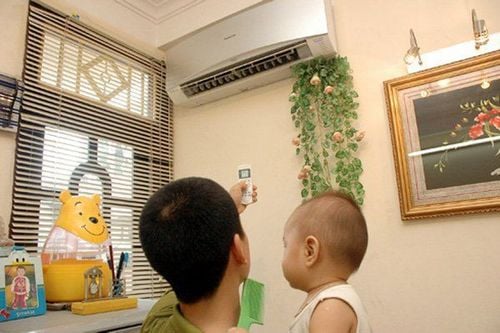
2. Should Children with Cough Sleep with a Fan or Air Conditioner?
Children, especially infants, cannot regulate their body temperature well and are sensitive to temperature changes. Parents should maintain a stable room temperature for their children, avoiding sudden and large temperature changes that can affect their health. Using a fan or air conditioner can significantly impact a child's health if not used correctly.
2.1. Be Cautious with Air Conditioners
Air conditioners provide a more stable temperature than fans, especially on hot days. However, air conditioners reduce humidity and air circulation, and improper temperature settings can cause nasal inflammation, pneumonia, etc., in children.
The ideal air conditioner temperature for children is between 26-28°C. On hot days, parents often set the air conditioner to a low temperature with strong airflow, which can worsen a child's cough with phlegm. Cold air from the air conditioner quickly dries the air, reducing room humidity to around 50%. Cold, dry air can dry out a child's respiratory tract, increasing throat inflammation. This leads to more phlegm production and persistent coughing.
Place a bowl of water, a damp cloth, or a humidifier in the room to maintain air humidity, preventing dry skin, nose, and throat, and avoiding dehydration.
Avoid placing children directly in the airflow of the air conditioner. Instead, position them parallel to the airflow direction.
If children sweat profusely while sleeping, parents should frequently check their body temperature, dress them in breathable clothing, and wipe off sweat with a dry towel.
Use saline nasal drops to prevent dry nose and throat.
Regularly clean the air conditioner to prevent the growth of harmful bacteria and mold. Do not turn on the air conditioner continuously all day; turn it off at least twice a day for about an hour each time. During this time, use a fan to circulate air in the room, preventing stuffiness. Open all windows to eliminate potential pathogens that may thrive in a closed room. Give children frequent water when using the air conditioner.
Air conditioners stabilize room temperature but quickly dry out the air. Therefore, parents should provide children with additional fluids (oresol, fruit juice, milk, etc.).
Turn off the air conditioner before taking children out of the room. Sudden exposure to different temperatures can cause thermal shock. Turn off the air conditioner at least 5 minutes before taking children out to avoid significant temperature differences.
Cover children with a light blanket, protecting their chest and abdomen, but avoid covering their neck to prevent breathing difficulties or overheating, which can cause excessive sweating.
Use the air conditioner only when the weather is extremely hot. Avoid using the air conditioner when the weather is not too hot, opting for a gentle fan or natural ventilation instead. This helps limit the spread of viruses and bacteria and allows children to adapt to the natural environment, boosting immunity and resistance.
When returning from outside, let children rest and wipe off sweat before entering an air-conditioned room to help them adjust to the indoor temperature. Sudden exposure to cold air can cause thermal shock due to the temperature difference between the air-conditioned room and the outside, which can be more than 10°C if the air conditioner is set too low.
Use a fan to circulate air when using the air conditioner. Parents should use a fan to prevent air stagnation and stuffiness when using the air conditioner. Stuffy air can make children feel suffocated and uncomfortable, affecting their respiratory system. Additionally, stagnant air promotes the growth of airborne bacteria, making children more susceptible to illnesses. Therefore, using a fan in the room helps create air circulation, making the room more comfortable for children.
2.2. Do Not Use Fans Directly
Many families avoid using air conditioners, fearing it will make children more prone to illness, and opt for fans instead. However, using fans can blow air directly onto children, causing nasal congestion, breathing difficulties, and negatively affecting their respiratory system.
Fan blades can collect dust, blowing it towards children. Therefore, parents should set the fan to oscillate and avoid directing airflow straight at children. Do not use water mist fans for extended periods, as they increase air humidity, creating a favorable environment for mold and harmful bacteria to grow.
Fans continuously circulate air with high intensity, accelerating water evaporation. When children sleep in front of a fan, water evaporates quickly from their respiratory tract, especially when the fan is set to high and stationary. Children often sleep with their mouths open, making them more prone to dry mouth, throat, and bronchitis, causing throat swelling.
When a child has a cough with phlegm, parents should not place the fan directly in front of them, nor should they direct the airflow from the feet to the head (as the airflow will blow into the nose and mouth). Instead, the fan should be angled, directing airflow from the body down to the feet, about 1 meter away from the child's sleeping area.
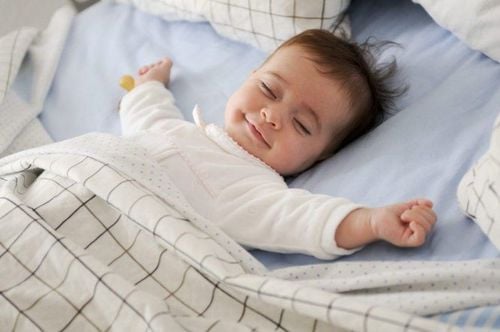
3. What to Do When a 5-Month-Old Has a Cough and Runny Nose?
If a young child has a cough and runny nose, parents can still let them sleep with the air conditioner on, but remember to cover the child's chest with a light blanket and set the air conditioner to an appropriate temperature. Additionally, follow these tips to prevent the condition from worsening:
3.1. Avoid Going Outside Early in the Morning In the early morning, the outside temperature is much lower than the indoor temperature (at least 2-3 degrees) and windier. Taking children outside early in the morning can cause colds, wind exposure, and coughing. If a 5-month-old child has a cough and runny nose, it will worsen. Morning dew is very cold, and if children stand outside or near an open window, they can inhale the dew, causing allergic coughs and increased phlegm production.
To protect children, parents should not take them outside immediately after waking up but let them stay indoors for 5-10 minutes to adjust to the waking state. This improves the body's cold resistance. On normal days, do not take children outside before 7 AM; on cold days, only take them outside after 8 AM.
3.2. Avoid Going Out Late In the late afternoon, the temperature drops quickly, especially after 5 PM. Rapid temperature drops can make it difficult for children to adapt, causing coughs with phlegm. The respiratory system needs to produce more mucus to humidify the air. When the respiratory system cannot keep up, it causes more coughing.
Parents should bring children home before 5:30 PM in summer and 5 PM in autumn and winter. Do not let children stay outside after 6 PM. When outside in the late afternoon, parents should hold children close, facing away from the wind, with the child's chest and abdomen against their body (do not place children in a stroller) to block the wind and keep them warm, minimizing the risk of colds.
3.3. Use Saline Solution to Clean the Nose and Throat
When children show signs of sneezing, runny nose, and frequent nasal congestion, parents should clean their noses 4-6 times a day with saline solution. The more runny the nose, the more parents should clean it to reduce inflammation.
For children with nasal congestion, after 1-2 minutes of saline drops, the mucus will thin and flow out. Parents can then gently suction the mucus using a nasal aspirator.
3.4. Elevate the Head When Sleeping
If children have a cough, sneezing, runny nose, and nasal congestion, parents should elevate the pillow slightly higher than usual when they sleep. This helps children breathe more easily and reduces coughing.
3.5. Provide Nutritional Supplements
When a 5-month-old child has a cough and runny nose, parents should maintain a reasonable diet to provide adequate nutrition, enhancing the child's resistance to pathogens and helping them recover faster. Increase breastfeeding or formula feeding to boost nutrition and hydration.
3.6. Use a Humidifier
Dry weather or prolonged use of air conditioning can cause children to inhale too much dry air, leading to coughing, sneezing, runny nose, and nasal congestion. Therefore, parents should place a humidifier in the child's bedroom to maintain adequate humidity, making the child feel more comfortable.
These are some tips for parents to consider when deciding whether to use a fan or air conditioner for a child with a cough. Additionally, parents should note the proper use of fans and air conditioners to maintain good health for their children.
To arrange an appointment, please call HOTLINE or make your reservation directly HERE. You may also download the MyVinmec app to schedule appointments faster and manage your reservations more conveniently.




